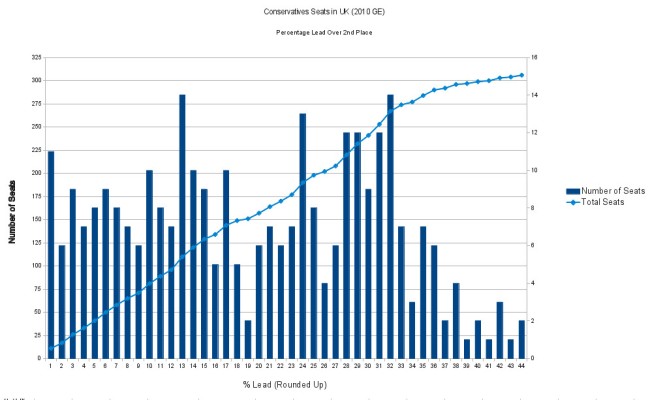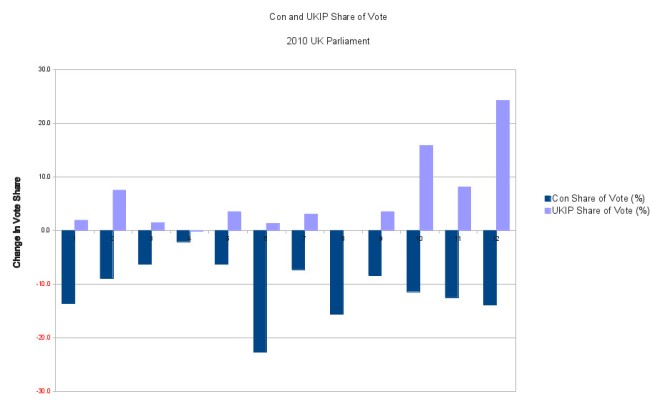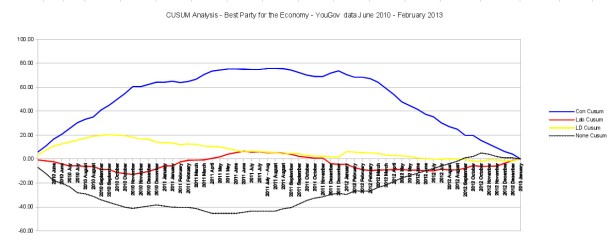“Anyone in this party who’s in any doubt who we should be fighting, what we should be debating, where our energies should be focused – I tell you: our battle is with Labour. This is a bunch of self-satisfied Labour socialists who think they can spend your money better than you can, make decisions better than you can and tell you what to do, and we should never, ever let that lot near government again.”
David Cameron, Conservative Spring Conference, 16th March 2013.
This passage from David Cameron reveals the hole in which he and his party find themselves.
The Conservatives surely never thought it could get as bad as this. Several things have come together.
Firstly, their key aim of this Parliament was the elimination of the deficit, an aim now stretched out way into the the distance. The austerity medicine delivered has killed patient. 2013, instead of seeing strong economic growth as predicted on 2010, is a zero growth struggling mess.The Government is actually more more money, not less, to plug that gap left by anemic economic activity.
Secondly, David Cameron policies have been a story of flip-flop, cock-up and disaster. The Coalition agreement always a back-of-the-fag-packet look about, and this has been borne out in practice Some policies such as NHS and education reform have been carried our despite deep unpopularity and the obvious fact they will not work. Other policies have been ditched for no reason other trying to popular after the event, such as the minimum price of alcohol.
Thirdly, they expected Ed Miliband to be a disaster. To their shock, Ed has not only not been a disaster, he is doing well. The Labour Party has not fallen apart, but has actually been a successful tactical opposition at least. This week’s PMQ’s, with Ed’s joke about organising things in a brewery, demonstrated the it is David Cameron, not Ed Miliband who appears on the back foot and struggling.
Not only does the Prime Minister have a united opposition to trouble him. The Conservative Party is split and ill-disciplined about issues such as gay marriage and Europe. Many Tory MPs see the Prime Minister’s stance as not Conservative enough, blaming the Liberal Democrats for unduly influencing the Coalition. This has created an opportunity that UKIP has taken with both hands. Eastleigh’s by election humiliation, where UKIP forced the Conservatives into third, was a stinging blow.
The polls also show no comfort either. A recent large poll by Lord Ashcroft showed how successful Labour could be in 2015 and how poor Conservative supporters thought their chances were. Polls have been showing a strong Labour lead of about 10 points for many months.
All these factors led David Cameron to his speech. He knows he is looking down the barrel of defeat if he gets to 2015 as leader. He also knows that he is polling the sort of numbers that Maggie Thatcher was when removed as leader. In addition, he knows that polling at the low 30’s is the irreducible core vote that they got at their biggest kicking in the modern era – 1997.
So should Labour prepare for Government?
Labour is in a strong position, yet quite frankly have done very little. To just allow the Government enough rope to hang himself is not enough. It is complacent and will not allow Ed to lead what would be needed in 2015 – a national renewal on the scale of 1945,
The real fear for Labour has always been stigmatised with being associated tax and spending. Virtually all we have heard from the Government since 2010 is blaming Labour for spending too much. Labour has meekly defended itself at best, and so it has stuck firmly despite being fundamentally wrong.
In addition, the signs are that Labour are drifting to the next election with caution, and a probability to match the Conservatives spending plans as Tony Blair and Gordon Brown did in 1997.
This would be very bad, as the clear aim of Cameron’s Government has been to privatise health and education, destroy the public sector and dismantle the welfare state. Another five years of following this Governments spending plans would make these changes permanent. What is required is a clear and loud rejection of austerity, and a laying to rest the economic myths that have now sadly become unquestioned. Anyone who thinks that these myths are true, don’t listen to amateur left bloggers, read the works of Paul Krugman (Nobel prize winning economist) and others.
Given the weakness of the Conservatives, now is the time to strike and strike hard. Labour now has only a few years to set out an alternative economic agenda. It will take time to blow away the myths, and this conversation may not be easy.
Labour needs to articulate their plans for health and education, and on how key services can be better by not auctioning them off to highest bidder. We need to accept that the treatment of the poor, frail and elderly in the UK is a disgusting abuse that shames us all. Vulnerable people need the dignity and care they deserve in a civilised society.
The need for not just growth, but the right growth should be made. We don’t need everyone to buy a new TV or pile money again into a housing bubble, we need to grow by building low carbon energy technologies that supply us for decades cleanly and safely. We need to build in infrastructure – better, cleaner transport and high-speed broadband – that can be the backbone of future businesses. We need to ensure we build enough high quality housing to ensure that everyone can live in a modern, energy efficient home that ordinary people can afford.
The values of our society need to be challenged. As a nation we simply cannot accept the inequality hard-wired into our economic system. Work should earn a living wage, and excessive salaries by the elite should be both limited and action taken to ensure they are not squirreled away in off-shore tax havens.
These are the bold messages that Labour should be shouting from the roof tops now, and every minute up the next election. Labour are well placed to lead a coalition of the left, and with the agenda set out here would surely drive Cameron and company out of Downing Street and deliver a society we could all be proud of.





